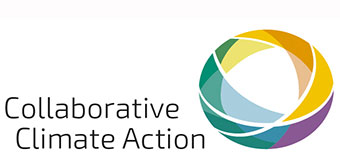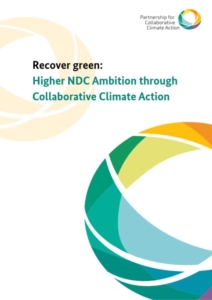The benefits of cities for higher NDC ambition and post-COVID recovery
Event Summary
On November 17, GIZ, UN Habitat and NDC Partnership hosted a joint event titled “Benefits of Cities for higher ambition NDCs and post-COVID recovery”. Cities and their inhabitants are responsible for around 70% of energy-related greenhouse gas emissions, but the concentration of population and infrastructure also bear huge potentials for emissions reductions and climate change adaptation measures.
UN Habitat and GIZ via the Partnership for Collaborative Climate Action have recently published a Guide and Discussion Paper respectively as a resource for decision-makers to improve low-carbon and resilient urban development. The publications were presented by both organisations picking up on the topic of recovery from COVID-19.
The following panel discussion included speakers from national governments, cities and networks:
- Faustin Munyazikwiye, Deputy Director General Rwanda Environmental Management Authority
- John Henry Melo, Coordinator of the NDC Update at the Ministry of Environment of Colombia
- Stefan Wagner, Head of International Affairs and Global Sustainability, City of Bonn, Germany
- Maryke Van Staden, Director of the Bonn Center for Local Climate Action and Reporting, Director of Business Development, ICLEI World Secretariat
The first part of the discussion focused on the question of how to secure the coordination between local and national climate action measures considering the impacts from the pandemic. Faustin Munyazikwiye from Rwanda stressed the importance of mainstreaming climate action measures into all sectors and local government plans as well as creating accountability using “vertical performance contracts” and robust MRV systems. In Colombia, the climate change law requires municipalities to formulate climate change management plans referring to both mitigation and adaptation, showing that good coordination can be secured best where clear regulations concerning the mode of cooperation are in place. The representatives from Bonn and ICLEI referred to subnational climate finance as an important leverage point. European cities could profit from more rapid and direct access to EU funding with clearly defined mandates for local governments.
However, the good cooperation between government levels has been challenged by the effects of the pandemic, which have been felt very directly especially at the local level. The panellists agreed that COVID-19 has led to competing priorities between health and climate action, with financial resources being redirected towards crisis mitigation. The Rwandan representative however stressed that climate change leads to deaths today, due to for example flooding. John Henry Melo from Colombia noted that the cost of inaction is likely higher than the cost of adaptation and mitigation. Stefan Wagner from the City of Bonn and Maryke van Staden from ICLEI agreed that coherent, ambitious and innovative policies are necessary for local governments to become active, and that the lead-up to COP26 should be used to convey this perspective form local governments.
Please view below a recording of the joint online event.


